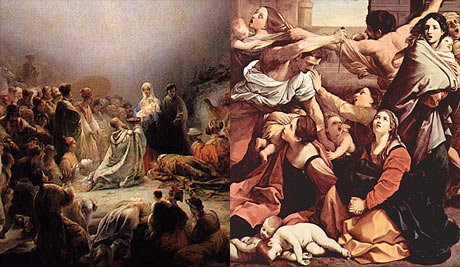In the 1980s New Zealanders Mick and Ruby Duncan chose to live among the desperately poor in one of Manila's slum communities. It was not a popular road, or an easy one, but one they chose out of love for God and neighbor. They stepped out in faith and spent ten years loving their poor neighbors and establishing a church.
In the midst of their sacrificial service they experienced something which is common among our neighbors who are poor: they suffered the loss of a son due to illness.
The Duncans were faithful people, following God as best they knew how, and yet they experienced a soul-crushing tragedy. When they returned home they began to speak in churches about their suffering and about the challenges this loss had brought to their faith. Like a magnet, the Duncans drew those who wanted to talk about their painful losses but felt the church culture around them made it difficult to openly acknowledge the truth that Christians aren't exempt from tragedy.
I'm not certain where this fallacy about a Christian's immunity from suffering comes from. Actually, it is mainly a western phenomenon; my Christian friends from the majority world live under no such delusion. They take Jesus at his word when he says, “In this world you will have trouble,” (John 16:33) and so they are able to receive the hope of the second half of the verse, “But take heart! I have overcome the world.”
As Epiphany approaches our attention turns from angels and mangers to wise men and massacres. Somehow Matthew 2 holds together the Magi's worship and Herod's butchery. In just a few verses we witness distant dignitaries prostrate at the cradle of Christ, and the so-called king of the Jews ordering the murder of children whose only crime was being born in the wrong place at the wrong time. The two stories are in fact connected. One does not exist without the other, blessing and tragedy live side by side.
It should not be lost on us that the tragedy of infanticide fell upon faithful Jews, while the blessing of God's revelation fell to pagan Magi. It was these outsiders to the faith who were the first people recorded to have “worshiped” Christ, while God's people experienced savagery at the hands of their own king.
Our comfort does not appear to be a primary concern of God's. Christ promised that his followers would be persecuted, hated and put to death as a result of following him (Matthew 24:9) and that families would experience division on account of him (Luke 12:52). Consider the simple fact that God himself did not escape torture and tragedy at the hands of sinful humans. These should have been clues. God's concerns involve establishing peace in and through us. God promises to be present with us in the midst of trouble. God's mission involves the forgiveness of sins. But a protective force-field keeping us safe from the brokenness and heartache of the world? Not so much.
In fact the image Christ paints regarding our presence in this world is that of sheep among wolves—the vulnerable among predators. We are to step into the anguish of the least, lost and broken—without hazmat suits, completely exposed, susceptible to their diseases, their pain and, like the Duncans and their son, the deaths that they die.
What kind of a God would choose to make a world knowing there would be suffering? One who values free creatures over sterile automatons. People free to make choices that can either build up or destroy. People capable of real actions with real consequences. The suffering of the world is not evidence of God's impotence, then, but evidence of God's disdain for human puppet shows. If it was God's good pleasure to make a creature that could willingly reciprocate his love and choose to extend mercy and kindness to others, then that creature must also have the freedom to embrace wickedness and partake of injustice. Otherwise love and mercy and kindness would be programmed actions.
God's love cannot be constrained—even by suffering. But is a redemptive outcome to our suffering necessary for us to accept it, or is God's love and nearness to us sufficient? The radioactive core of Romans 8 is not the power of some redemptive purpose in suffering but the power of God's love in the midst of our suffering.
Who shall separate us from the love of Christ? Shall trouble or hardship or persecution or famine or nakedness or danger or sword? As it is written: ‘For your sake we face death all day long; we are considered as sheep to be slaughtered.’
Romans 8:35-36
The suffering of God's followers is an expected consequence of following the “Suffering Servant.” Yet God is good even though we grieve. But we do not grieve like those who have no hope. Ours is a hope-filled grief, a suffering with Christ's company. Tragedy bound together with God’s love and nearness.
Epiphany reminds us that both suffering and worship are part of the story we inhabit. We cannot disentangle them, but must allow them to live side by side. Let us accept the reality of following Christ without a force field, exposing ourselves to the world's heartache and God's love.
In this world we will have trouble, but take heart…
